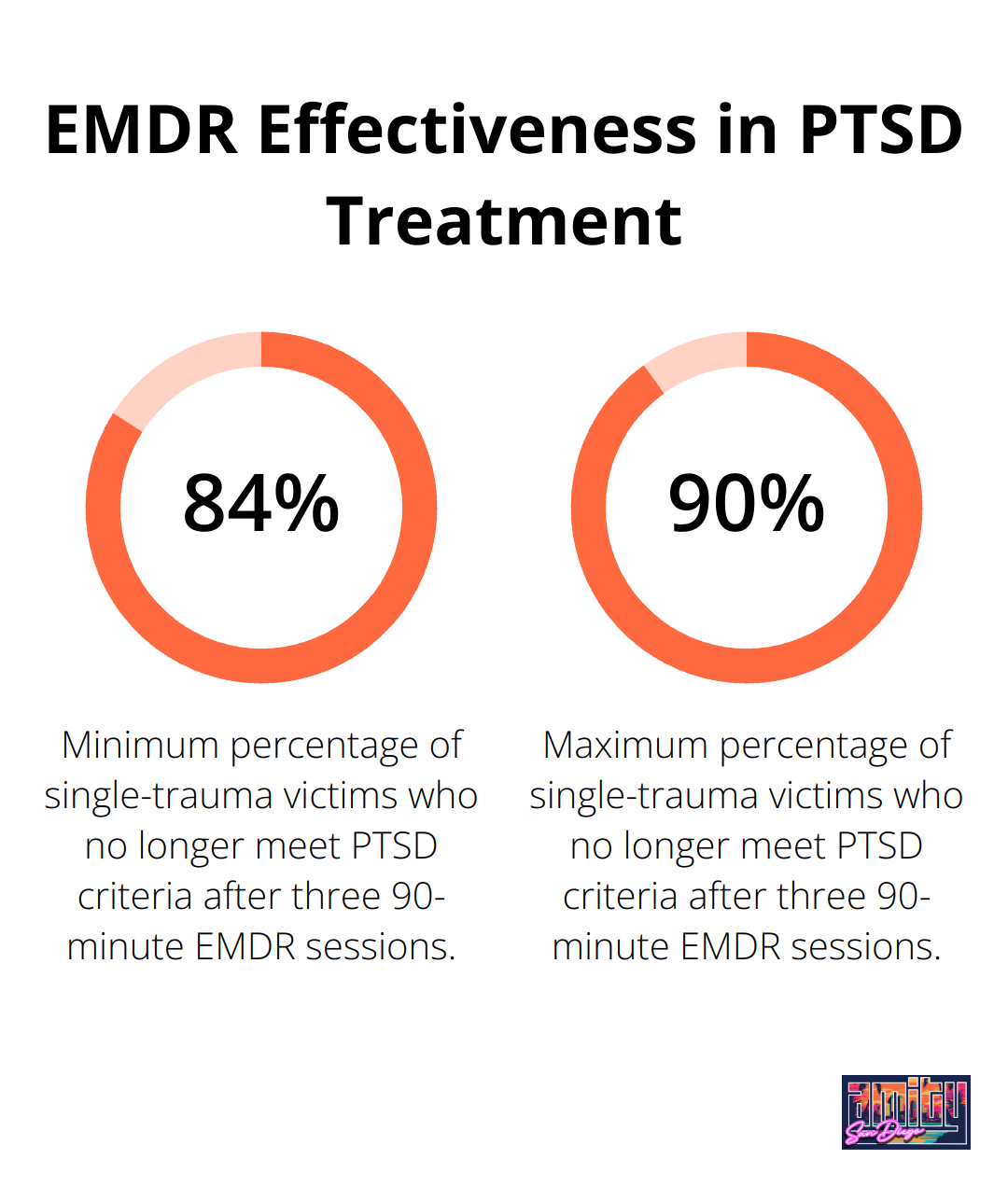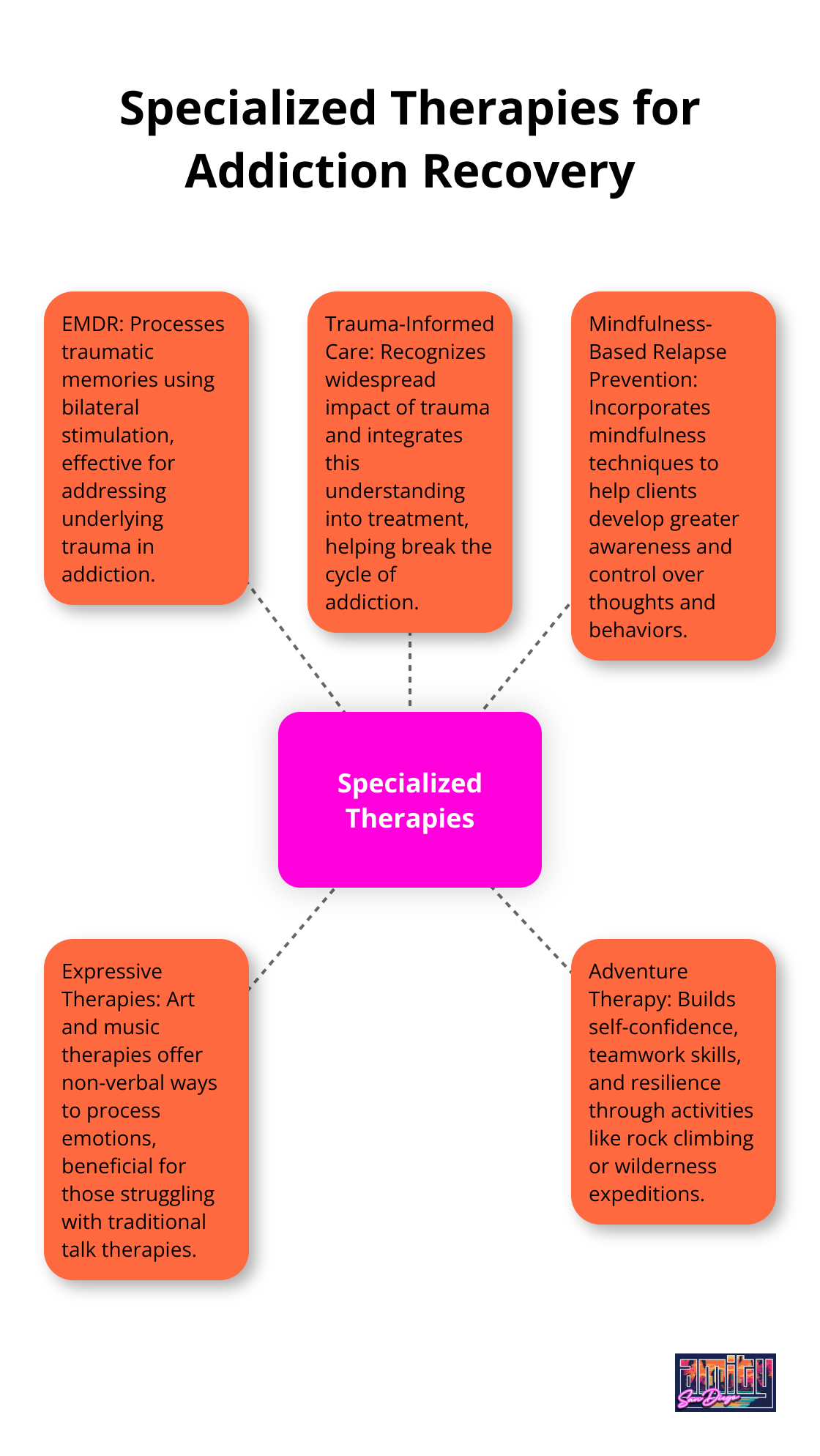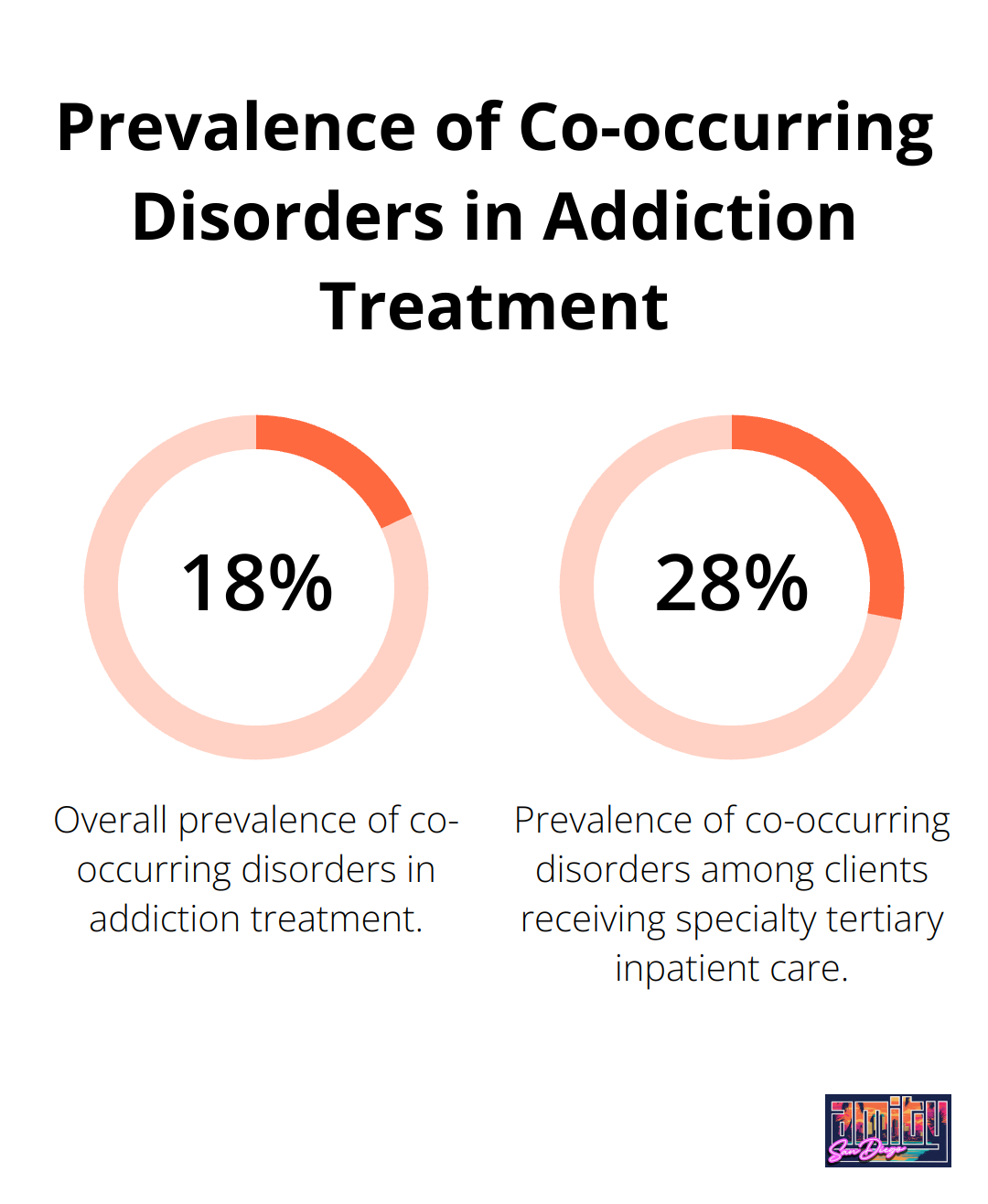At Amity San Diego, we understand that finding the right therapy options for addiction recovery can be overwhelming. The path to healing is unique for everyone, and there’s no one-size-fits-all approach.
In this blog post, we’ll explore various therapy options available for addiction treatment, from traditional methods to specialized techniques. We’ll also provide guidance on how to choose the most effective therapy for your individual needs and circumstances.
Effective Therapy Approaches for Addiction Recovery
At Amity San Diego, we’ve witnessed the transformative power of various therapy approaches in addiction recovery. Let’s explore some of the most effective methods we use to help our clients heal and reclaim their futures.
Cognitive Behavioral Therapy (CBT)
CBT forms the foundation of addiction treatment. This approach helps individuals identify and change negative thought patterns and behaviors associated with substance use. CBT proves particularly effective for relapse prevention. Clients learn to recognize triggers, develop coping strategies, and build resilience against cravings.
Research suggests that CBT can be effective in reducing the likelihood of relapse among drug users, although brief interventions (BI) may be more effective than CBT for relapse prevention in some cases.
Dialectical Behavior Therapy (DBT)
DBT serves as another powerful tool in addiction recovery, especially for those who struggle with emotional regulation and interpersonal relationships. Originally developed for treating borderline personality disorder, it has proven highly effective for addiction recovery.
DBT focuses on four key areas: mindfulness, distress tolerance, emotion regulation, and interpersonal effectiveness. These skills prove crucial for maintaining sobriety in challenging situations.
Motivational Interviewing (MI)
MI takes a client-centered approach that helps individuals find their own motivation for change. It works particularly well for those who feel ambivalent about recovery. Therapists use MI to help clients explore their values and goals, strengthening their commitment to sobriety.
Recent research suggests that motivational interviewing may reduce substance use compared with no intervention up to a short follow-up period.
Group Therapy
Group therapy provides a supportive environment where clients can share experiences, learn from others, and practice new social skills. The power of peer support in recovery cannot be overstated.
Family Therapy
Addiction affects not just the individual, but the entire family system. Family therapy sessions help repair relationships, improve communication, and create a supportive home environment for recovery.
Research indicates that families are powerful resources for enhancing treatment and recovery success among youth with substance use disorders. Family therapy can significantly improve outcomes in addiction treatment.
These therapy approaches can be tailored to each client’s unique needs. An experienced team of therapists should work closely with clients to determine the most effective combination of therapies for their individual recovery journey.
As we move forward, let’s explore some specialized therapies that can complement these core approaches and address specific aspects of addiction recovery.
Specialized Therapies for Lasting Recovery
At Amity San Diego, we offer a diverse range of specialized therapies to address the complex nature of addiction. These innovative approaches complement our core treatment methods and can be particularly effective for individuals with specific needs or those who haven’t found success with traditional therapies alone.
Eye Movement Desensitization and Reprocessing (EMDR)
EMDR is a powerful tool for addressing trauma, which often underlies addiction. This therapy uses bilateral stimulation (typically through eye movements) to help process traumatic memories. Studies show EMDR can significantly reduce PTSD symptoms, with 84-90% of single-trauma victims no longer meeting PTSD criteria after only three 90-minute sessions.

Trauma-Informed Care
Trauma-informed therapy recognizes the widespread impact of trauma and integrates this understanding into every aspect of treatment. In models of trauma-informed care developed for alcohol and drug use settings, trauma is addressed via routine screening for symptoms of PTSD in clients. Addressing underlying trauma helps break the cycle of addiction and promotes lasting recovery.
Mindfulness-Based Relapse Prevention
Mindfulness techniques prove increasingly effective in addiction treatment. A recent study compared the efficacy of mindfulness-based relapse prevention (MBRP) with relapse prevention (RP) on reducing alcohol consumption. We incorporate these practices into treatment plans to help clients develop greater awareness and control over their thoughts and behaviors.
Expressive Therapies
Art and music therapies offer non-verbal ways for clients to process emotions and experiences. These approaches benefit those who struggle with traditional talk therapies. Research indicates that music therapy can reduce anxiety and depression symptoms in substance abuse treatment, while art therapy increases motivation and engagement in the recovery process.
Adventure Therapy
Adventure therapy (which includes activities like rock climbing or wilderness expeditions) can transform some individuals in recovery. This approach builds self-confidence, teamwork skills, and resilience. A study of adolescents in substance abuse treatment found that those who participated in adventure therapy showed significant improvements in self-efficacy and decreased substance use compared to those who didn’t.

These specialized therapies offer unique pathways to healing and recovery. The next section will guide you through the process of choosing the right therapy options for your individual journey.
How to Choose the Right Therapy for Your Recovery
Selecting the most effective therapy for addiction recovery marks a pivotal step in your healing journey. At Amity San Diego, we’ve witnessed how the right therapeutic approach transforms lives. Here’s how to navigate this important decision:
Assess Your Unique Situation
Take an honest look at your specific needs. Consider the substance(s) you struggle with, the duration of your addiction, and any past treatment experiences. For opioid addiction, medication-assisted treatment (MAT) combined with behavioral therapy often proves most effective. MAT can reduce the risk of overdose deaths and behaviors that increase the risk of infectious disease.
Address Co-occurring Mental Health Issues
Identify and treat any co-existing mental health conditions. Research indicates that the prevalence of co-occurring disorders is about 18.5%, with the highest rates among clients receiving specialty tertiary inpatient care (28%). If you experience symptoms of anxiety, depression, or PTSD alongside addiction, seek a treatment center that offers integrated dual diagnosis care.

Evaluate Treatment Center Offerings
Research potential treatment centers thoroughly. Look for facilities that offer a wide range of evidence-based therapies. Check their accreditations, staff qualifications, and success rates. Ask about their specific approach to addiction treatment and how they tailor programs to individual needs.
Prioritize Personalized Treatment Plans
One-size-fits-all approaches rarely work in addiction recovery. Seek out centers that create individualized treatment plans. These should adapt as your needs change throughout recovery. A good treatment plan will incorporate a mix of therapies, addressing both the addiction and any underlying issues.
Consider Specialized Therapies
Depending on your specific situation, specialized therapies can prove incredibly beneficial. Evidence-based therapies may include experiential therapies such as art therapy, music therapy, equine therapy, creative writing therapy, and adventure therapy. These can be particularly helpful for addressing specific aspects of addiction and recovery.
The journey to recovery from addiction is unique for each individual, and the choice of treatment often hinges on personal circumstances and the severity of the addiction.
Final Thoughts
The journey to addiction recovery requires personalized therapy options tailored to individual needs. At Amity San Diego, we offer a range of evidence-based treatments to address both addiction and underlying mental health concerns. Our experienced team works closely with each client to create a comprehensive treatment plan that combines effective therapies for lasting recovery.
Professional guidance plays a vital role in navigating the various therapy options for addiction treatment. We provide a safe, supportive environment where individuals can explore different approaches and find the most effective combination for their unique situation. Our goal is to empower clients with the tools and support they need to achieve long-term sobriety and reclaim their lives.
Taking the first step towards recovery marks the beginning of a transformative journey. We encourage you to reach out and explore the therapy options available to you at Amity San Diego. Your path to healing and a brighter future starts today, and we’re here to support you every step of the way.

